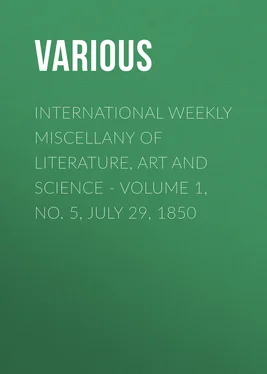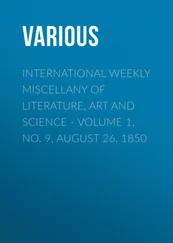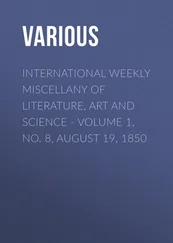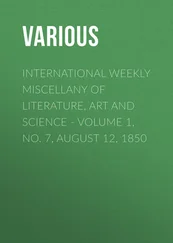Various - International Weekly Miscellany of Literature, Art and Science - Volume 1, No. 5, July 29, 1850
Здесь есть возможность читать онлайн «Various - International Weekly Miscellany of Literature, Art and Science - Volume 1, No. 5, July 29, 1850» — ознакомительный отрывок электронной книги совершенно бесплатно, а после прочтения отрывка купить полную версию. В некоторых случаях можно слушать аудио, скачать через торрент в формате fb2 и присутствует краткое содержание. Жанр: foreign_antique, periodic, foreign_edu, на английском языке. Описание произведения, (предисловие) а так же отзывы посетителей доступны на портале библиотеки ЛибКат.
- Название:International Weekly Miscellany of Literature, Art and Science - Volume 1, No. 5, July 29, 1850
- Автор:
- Жанр:
- Год:неизвестен
- ISBN:нет данных
- Рейтинг книги:5 / 5. Голосов: 1
-
Избранное:Добавить в избранное
- Отзывы:
-
Ваша оценка:
- 100
- 1
- 2
- 3
- 4
- 5
International Weekly Miscellany of Literature, Art and Science - Volume 1, No. 5, July 29, 1850: краткое содержание, описание и аннотация
Предлагаем к чтению аннотацию, описание, краткое содержание или предисловие (зависит от того, что написал сам автор книги «International Weekly Miscellany of Literature, Art and Science - Volume 1, No. 5, July 29, 1850»). Если вы не нашли необходимую информацию о книге — напишите в комментариях, мы постараемся отыскать её.
International Weekly Miscellany of Literature, Art and Science - Volume 1, No. 5, July 29, 1850 — читать онлайн ознакомительный отрывок
Ниже представлен текст книги, разбитый по страницам. Система сохранения места последней прочитанной страницы, позволяет с удобством читать онлайн бесплатно книгу «International Weekly Miscellany of Literature, Art and Science - Volume 1, No. 5, July 29, 1850», без необходимости каждый раз заново искать на чём Вы остановились. Поставьте закладку, и сможете в любой момент перейти на страницу, на которой закончили чтение.
Интервал:
Закладка:
"On working days, this vista was almost a desert, but when Sunday came, it was made lively by groups of sailors, rich and idle citizens, and whole families of mercantile men who came to bathe or rest themselves, there enjoying the luxury both of the shade and of the sea. The mingled murmur of the voices both of men, women and children, enchanted with sunlight and with repose, united with the babbling of the waves which seemed to fall on the shore light and elastic as sheets of steel. Many boats either by sails or oars, were wafted around the extremity of Cape Notre-Dame de la Garde, with its heavy grove of shadowy pines; as they crossed the gulf, they touched the very margin of the water, to be able to reach the opposite bank. Even the palpitations of the sail were audible, the cadence of the oars, conversation, song, the laughter of the merry flower and orange-girls of Marseilles, those true daughters of the gulf, so passionately fond of the wave, and devoted to the luxury of wild sports with their native element were heard.
"With the exception of the patriarchal family of the Rostand, that great house of ship-owners, which linked Smyrna, Athens, Syria and Egypt to France by their various enterprises, and to whom I had been indebted for all the pleasures of my first voyage to the East; with the exception of M. Miege, the general agent of all our maritime diplomacy in the Mediterranean, with the exception of Joseph Autran, that oriental poet who refuses to quit his native region because he prefers his natural elements to glory, I knew but few persons at Marseilles. I wished to make no acquaintances and sought isolation and leisure, leisure and study. I wrote the history of one revolution, without a suspicion that the spirit of another convulsion looked over my shoulder, hurrying me from the half finished page, to participate not with the pen, but manually, in another of the great Dramas of France.
"Marseilles is however hospitable as its sea, its port, and its climate. A beautiful nature there expands the heart. Where heaven smiles man also is tempted to be mirthful. Scarcely had I fixed myself in the faubourg, when the men of letters, of politics,—the merchants who had proposed great objects to themselves, and who entertained extended views; the youth, in the ears of whom yet dwelt the echoes of my old poems; the men who lived by the labor of their own hands, many of whom however write, study, sing, and make verses, come to my retreat, bringing with them, however, that delicate reserve which is the modesty and grace of hospitality. I received pleasure without any annoyances from this hospitality and attention. I devoted my mornings to study, my days to solitude and to the sea, my evenings to a small number of unknown friends, who came from the city to speak to me of travels, literature, and commerce.
"Commerce at Marseilles is not a matter of paltry traffic, or trifling parsimony and retrenchments of capital. Marseilles looks on all questions of commerce as a dilation and expansion of French capital, and of the raw material exported and imported from Europe and Asia. Commerce at Marseilles is a lucrative diplomacy, at the same time, both local and national. Patriotism animates its enterprises, honor floats with its flag, and policy presides over every departure. Their commerce is one eternal battle, waged on the ocean at their own peril and risk, with those rivals who contend with France for Asia and Africa, and for the purpose of extending the French name and fame over the opposite continents which touch on the Mediterranean.
"One Sunday, after a long excursion on the sea with Madame Lamartine, we were told that a woman, modest and timid in her deportment, had come in the diligence from Aix to Marseilles, and for four or five hours had been waiting for us in a little orange grove next between the villa and the garden. I suffered my wife to go into the house, and passed myself into the orange grove to receive the stranger. I had no acquaintance with any one at Aix, and was utterly ignorant of the motive which could have induced my visitor to wait so long and so patiently for me.
"When I went into the orange grove, I saw a woman still youthful, of about thirty-six or forty years of age. She wore a working-dress which betokened little ease and less luxury, a robe of striped Indienne , discolored and faded; a cotton handkerchief on her neck, her black hair neatly braided, but like her shoes, somewhat soiled by the dust of the road. Her features were fine and graceful, with that mild and docile Asiatic expression, which renders any muscular tension impossible, and gives utterance only to inspiring and attractive candor. Her mouth was possibly a line too large, and her brow was unwrinkled as that of a child. The lower part of her face was very full, and was joined by full undulations, altogether feminine however in their character, to a throat which was large and somewhat distended at the middle, like that of the old Greek statues. Her glance had the expression of the moonlight of her country rather than of its sun. It was the expression of timidity mingled with confidence in the indulgence of another, emanating from a forgetfulness of her own nature. In fine, it was the image of good-feeling, impressed as well on her air as on her heart, and which seem confident that others are like her. It was evident that this woman, who was yet so agreeable, must in her youth have been most attractive. She yet had what the people (the language of which is so expressive) call the seed of beauty , that prestige , that ray, that star, that essence, that indescribable something, which attracts, charms, and enslaves us. When she saw me, her embarrassment and blushes enabled me to contemplate her calmly and to feel myself at once at ease with her. I begged her to sit down at once on an orange-box over which was thrown a Syrian mat, and to encourage her sat down in front of her. Her blushes continued to increase, and she passed her dimpled but rather large hand more than once over her eyes. She did not know how to begin nor what to say. I sought to give her confidence, and by one or two questions assisted her in opening the conversation she seemed both to wish for and to fear."
[This girl is Reine-Garde, a peasant woman, attracted by a passionate love of his poetry to visit Lamartine. She unfolds to him much that is exquisitely reproduced in Genevieve. The romance bids fair to be one of the most interesting this author has yet produced.]
"Madame ——," said I to her. She blushed yet more.
"I have no husband, Monsieur. I am an unmarried woman."
"Ah! Mlle, will you be pleased to tell me why you have come so far, and why you waited so long to speak with me? Can I be useful to you in any manner? Have you any letter to give me from any one in your neighborhood?"
"Ah, Monsieur, I have no letter, I have nothing to ask of you, and the last thing in the world that I should have done, would have been to get a letter from any of the gentlemen in my neighborhood to you. I would not even have suffered them to know that I came to Marseilles to see you. They would have thought me a vain creature, who sought to magnify her importance by visiting people who are so famous. Ah, that would never do!"
"What then do you wish to say?"
"Nothing, Monsieur ."
"How can that be? You should not for nothing have wasted two days in coming from Aix to Marseilles, and should not have waited for me here until sunset, when to-morrow you must return home."
"It is, however, true, Monsieur. I know you will think me very foolish, but ... I have nothing to tell you, and not for a fortune would I consent that people at Aix should know whither I am gone."
"Something however induced you to come—you are not one of those triflers who go hither and thither without a motive. I think you are intellectual and intelligent. Reflect. What induced you to take a place in the diligence and come to see me? Eh!"
Читать дальшеИнтервал:
Закладка:
Похожие книги на «International Weekly Miscellany of Literature, Art and Science - Volume 1, No. 5, July 29, 1850»
Представляем Вашему вниманию похожие книги на «International Weekly Miscellany of Literature, Art and Science - Volume 1, No. 5, July 29, 1850» списком для выбора. Мы отобрали схожую по названию и смыслу литературу в надежде предоставить читателям больше вариантов отыскать новые, интересные, ещё непрочитанные произведения.
Обсуждение, отзывы о книге «International Weekly Miscellany of Literature, Art and Science - Volume 1, No. 5, July 29, 1850» и просто собственные мнения читателей. Оставьте ваши комментарии, напишите, что Вы думаете о произведении, его смысле или главных героях. Укажите что конкретно понравилось, а что нет, и почему Вы так считаете.












